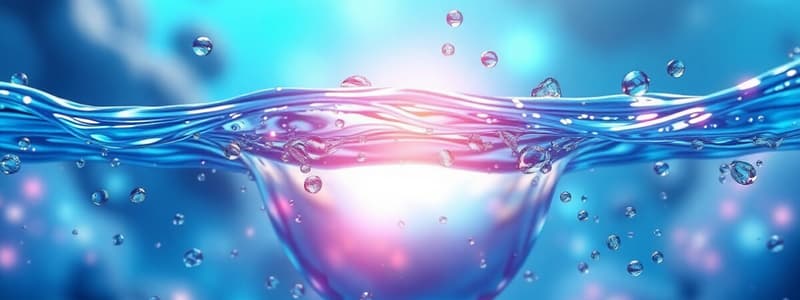Podcast
Questions and Answers
What property of water allows it to hold molecules together through hydrogen bonds?
What property of water allows it to hold molecules together through hydrogen bonds?
- Density
- Solubility
- Viscosity
- Polarity (correct)
Water can form hydrogen bonds with a maximum of 5 other molecules.
Water can form hydrogen bonds with a maximum of 5 other molecules.
False (B)
What is cohesion in the context of water?
What is cohesion in the context of water?
The attraction between water molecules due to hydrogen bonds.
What phenomenon allows some animals to walk on water?
What phenomenon allows some animals to walk on water?
What is specific heat?
What is specific heat?
Water maintains temperature fluctuations that are suitable for life.
Water maintains temperature fluctuations that are suitable for life.
At what temperature is water most dense?
At what temperature is water most dense?
Water is known as the universal ______.
Water is known as the universal ______.
Match the following properties of water with their corresponding effects or definitions:
Match the following properties of water with their corresponding effects or definitions:
Study Notes
Water molecules are polar, with a partial negative charge near oxygen and a partial positive charge near hydrogen. This polarity leads to unique properties.
Hydrogen bonds form between water molecules, allowing each to bond with up to four others, continuously forming, breaking, and reforming for structure.
Cohesion and Adhesion
- Cohesion, caused by hydrogen bonding, is the attraction between similar molecules, enabling water to move up plants via transpiration. Adhesion helps water move through different plant tissues.
Surface Tension
Surface tension is the energy required to increase a liquid's surface area due to cohesive forces, creating an elastic "skin." Water's high surface tension, from hydrogen bonding, allows small objects to float. Water also has a high specific heat, moderating temperatures and resulting in milder coastal climates compared to inland.
Evaporative Cooling
- Evaporative cooling involves liquid evaporation, removing heat and influencing Earth’s climate and organism temperature regulation.
Density of Water
- The density of water peaks at 4 degrees Celsius, expanding upon cooling to 0 degrees Celsius, preventing solid freezing and supporting aquatic life in winter.
Water as a Solvent
- Water, known as the "universal solvent," dissolves ionic compounds due to polar molecules that surround and separate ions. Polar molecules are soluble, while nonpolar molecules are not (hydrophobic). Many biological reactions occur in water, facilitating reactants and products.
Studying That Suits You
Use AI to generate personalized quizzes and flashcards to suit your learning preferences.
Related Documents
Description
Explore the intriguing properties of water molecules, focusing on their polarity and the significance of hydrogen bonding. Learn how these characteristics contribute to water's unique behaviors, including cohesion and adhesion. This quiz highlights the essential roles these properties play in nature and biology.




